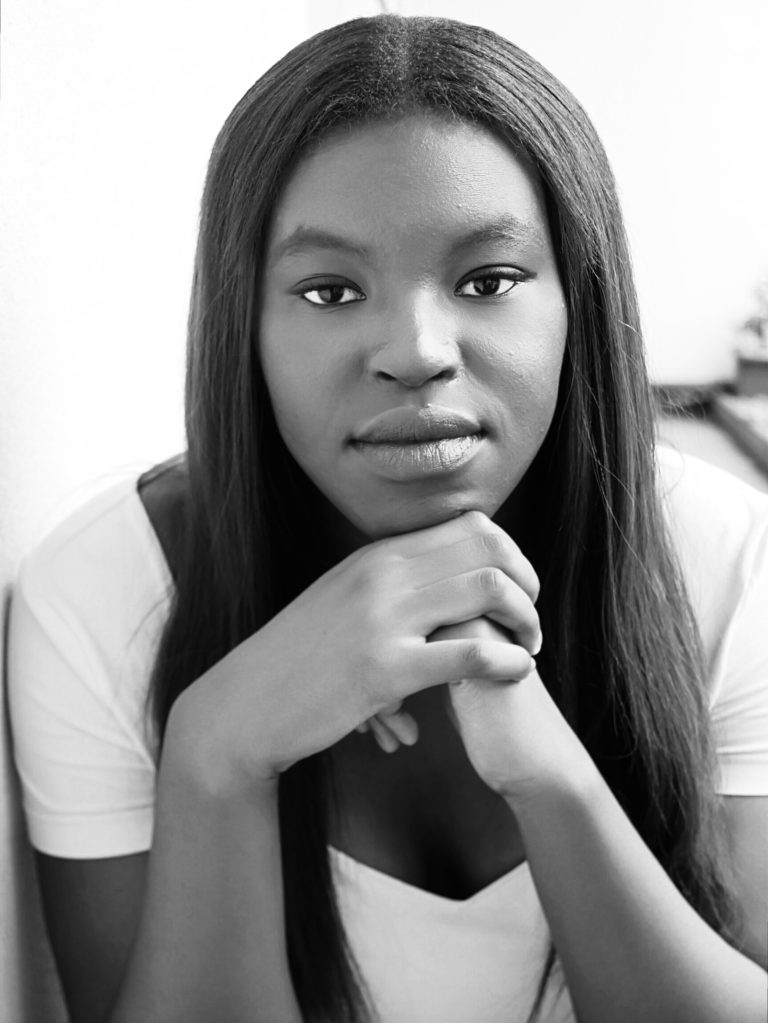Laurène Southe is a 25-year-old writer of Congolese heritage based in Vienna, Austria. She has works in Brittle Paper, The Shallow Tales Review and the African Migration Report Poetry Anthology. Since age 17, she has since built her passion for poetry by attending the Vienna African Writers Club in the African Studies department of the University of Vienna, and in 2021, she had her spoken word performance at the African Diaspora Festival in Klagenfurt. In 2022, Laurène took part in a group exhibition titled “An Der Schönen Blauen Donau” that aimed to demonstrate the power of poetry as both visual and performance art. During the Vienna Design Week in 2024, she performed her poems at the “A House is Not a Home” exhibition by curator and mentor Tonica Hunter. She’s also a 2023 Alumni of the Echo Correspondence writer residency where she wrote and finished her full-length collection, Child of Congo.
Isaiah Adepoju: What is your writing process like?
Laurène Southe: I think the best way I can describe my writing process is that I’m just like a sponge to my direct environment. I have conversations, I observe, and experience everything all at once. It is up to me to fish an idea in this endless sea of my subconsciousness and then, turn it into something malleable. Of course, there are outside forces that can enable a strong output, for example, listening to music or reading a book. To be frank, every writing piece I’ve ever written has its own unique backstory.
Isaiah Adepoju: How do you see your writing? Do you think of it as patriotic, as a literature of commitment?
Laurène Southe: I always told any readers who come across my work to view it just like a mirror. Because truly to the core, I want to believe that writing reflects our time. Grief, love, hope; those are all universal languages. You do not have to be Congolese or Nigerian to know what it is to dream, to want to honour your ancestors, bring forth your people’s beauty, resilience etc… There is a child of Congo within anyone under an imperial rule.
Isaiah: I read Child of Congo with relish. The collection situates itself in the Congo’s history, in its colonial history specifically. On the other hand, your biography is cosmopolitan as the term goes. You speak French, German, and English. Of Congolese descent, shuttling Austria, England, and Switzerland. How do these cultural belongings inform the gestation and the writing of this collection? Especially in the context of its interrogation of its power dynamics with the Global North.
Laurène: From the outside looking in, my story will appear distorted for most people. However, this is my entire life and there was a time I even thought that all children in the world were facing similar predicaments. I mean, what is the point in living in a world with so much diversity and never leaving the front step of your house? In terms of how it inevitably informs this collection; if anything, I think what it does is show how strong of a foundation I had in my household to the point that no matter what cultural shift I adapted to, it all stood against the backbone of my heritage.
Isaiah: Memory and politics always seem central to immigrant writing. For you, how has immigration changed your perception of “home,” culturally and politically especially? What is the location of memory in this change?
Laurène: To claim a piece of land as my nationality with zero lineage past my parents over another piece of land where there is historical context, you can track an entire graveyard with those who share my last name and the same blood as mine flows inside their veins. I mean, can you even compare? But that’s to say not every child of the diaspora will share the same sentiment. Within my own family, there are members who feel far more Austrian than Congolese. It is all up to how immigrant parents decide to raise their children in that change they have placed themselves and what memories of the past do they preserve.
Isaiah: What Congolese poets do you think are doing exceptional work? Do you have a favourite one to whose work you would happily return? And why?
Laurène: There isn’t a single Congolese poet that I am familiar with, but I can explain! [laugh]. I only started to search for Congolese writing after I completed my book. I always said that books are the soul to a community and therefore, I champion the work of all African literature. To be more precise, I would say all black members in the world.
You do not have to be Congolese or Nigerian to know what it is to dream, to want to honour your ancestors, bring forth your people’s beauty, resilience etc.
– Laurène Southe
3 Braids
Three different braids
The difference one more would make
Years intertwined with one another
I am tracing out my mother’s hands
Practice makes the master
I am taking back what was never theirs
May Angola’s clouds rain clear quartz tonight
They crowned my mother’s hands a lifelong supply
Fed the unborn through second generation’s gap
Crystallized weaves in one hand
A rough diamond in the other
A New World Is Born
If you truly knew me,
you would know
I am not rich in words.
I am a recount of tales
that were told through me,
passed down, mouth to mouth,
Feed to feed until a whole
village was birthed out of an open wound
Breath
-ing underneath my skin.



